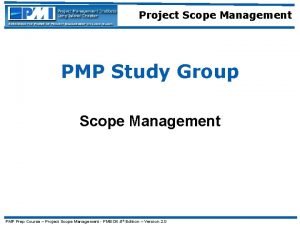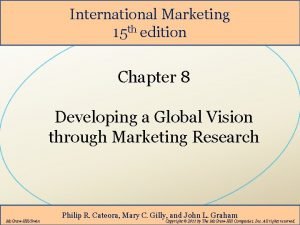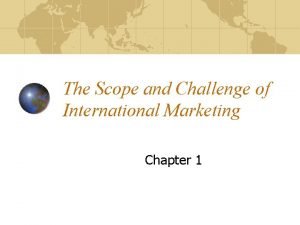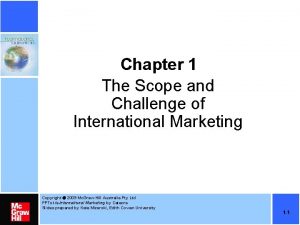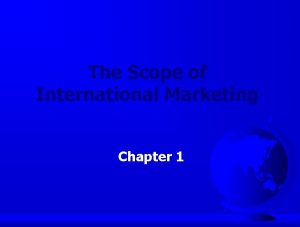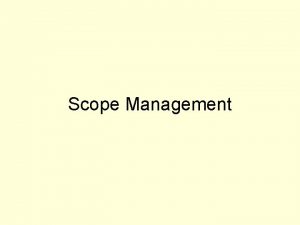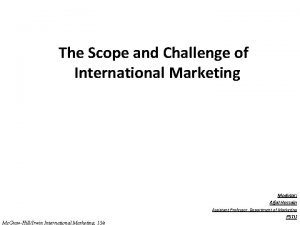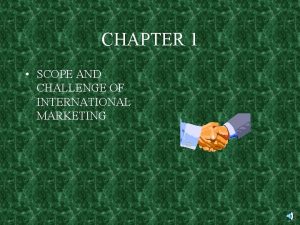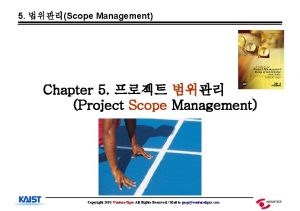Chapter 1 The Scope and Challenge of International
























- Slides: 24

Chapter 1 The Scope and Challenge of International Marketing Copyright 2009 Mc. Graw-Hill Australia Pty Ltd PPTs t/a International Marketing by Cateora Slides prepared by Kate Mizerski, Edith Cowan University 1 -1

Chapter Learning Objectives • The changing face of Australasian business • The scope of the international marketing task • The importance of the self-reference criterion (SRC) in international marketing • The progression of becoming a global marketer • The increasing importance of global awareness Copyright 2009 Mc. Graw-Hill Australia Pty Ltd PPTs t/a International Marketing by Cateora Slides prepared by Kate Mizerski, Edith Cowan University 1 -2

Copyright 2009 Mc. Graw-Hill Australia Pty Ltd PPTs t/a International Marketing by Cateora Slides prepared by Kate Mizerski, Edith Cowan University 1 -3

Global Perspective: Global Commerce Promotes Effective International Relationships • Global commerce requires knowledge about different markets – – – Economic situation Demographic characteristics Political situation Long-term conditions Emerging trends • Regional interests and global democratic values must be considered – Political considerations and government expectations are key inputs into effective relationship building. Copyright 2009 Mc. Graw-Hill Australia Pty Ltd PPTs t/a International Marketing by Cateora Slides prepared by Kate Mizerski, Edith Cowan University 1 -4

Copyright 2009 Mc. Graw-Hill Australia Pty Ltd PPTs t/a International Marketing by Cateora Slides prepared by Kate Mizerski, Edith Cowan University 1 -5

Events and Trends Affecting Global Business • The rapid growth of the World Trade Organisation and regional free trade areas. • The trend toward the acceptance of the free market system among developing countries in Latin America, Asia, and eastern Europe. • The burgeoning impact of the Internet, mobile phones, and other global media on the dissolution of national borders. • The mandate to properly manage the resources and global environment for the generations to come. Copyright 2009 Mc. Graw-Hill Australia Pty Ltd PPTs t/a International Marketing by Cateora Slides prepared by Kate Mizerski, Edith Cowan University 1 -6

Copyright 2009 Mc. Graw-Hill Australia Pty Ltd PPTs t/a International Marketing by Cateora Slides prepared by Kate Mizerski, Edith Cowan University 1 -7

The Internationalisation of Australian Business • Increasing globalisation of markets. • Increasing number of Australian companies are foreign controlled – A$1210 billion in foreign investment in Australia –roughly A$530 billion more than Australian overseas investment. – U. S. and U. K. are largest investors accounting for more than ½ of all foreign investment. • Increasing number of foreign companies establishing subsidiary operations or gaining entry through mergers with Australian companies. • Increasing difficulty for domestic markets to sustain customary rates of growth. Copyright 2009 Mc. Graw-Hill Australia Pty Ltd PPTs t/a International Marketing by Cateora Slides prepared by Kate Mizerski, Edith Cowan University 1 -8

Foreign Acquisitions of Australian Brands Copyright 2009 Mc. Graw-Hill Australia Pty Ltd PPTs t/a International Marketing by Cateora Slides prepared by Kate Mizerski, Edith Cowan University 1 -9

International Marketing Defined d International marketing is the performance of business activities designed to plan, price, promote, and direct the flow of a company’s goods and services to consumers or users in more than one nation for a profit. Copyright 2009 Mc. Graw-Hill Australia Pty Ltd PPTs t/a International Marketing by Cateora Slides prepared by Kate Mizerski, Edith Cowan University 1 -10

The International Marketing Task Copyright 2009 Mc. Graw-Hill Australia Pty Ltd PPTs t/a International Marketing by Cateora Slides prepared by Kate Mizerski, Edith Cowan University 1 -11

Copyright 2009 Mc. Graw-Hill Australia Pty Ltd PPTs t/a International Marketing by Cateora Slides prepared by Kate Mizerski, Edith Cowan University 1 -12

Environmental Adaptation Needed • Be able to interpret effectively the influence and impact of the culture in which you hope to do business – Cultural adjustments. • Establish a frame of reference. • Avoid measuring and assessing markets against the fixed values and assumptions of your own culture. Copyright 2009 Mc. Graw-Hill Australia Pty Ltd PPTs t/a International Marketing by Cateora Slides prepared by Kate Mizerski, Edith Cowan University 1 -13

The Self-Reference Criterion and Ethnocentrism • The key to successful international marketing is adaptation to the environmental differences from one market to another. • Primary obstacles to success in international marketing: SRC is an unconscious reference to one’s own cultural values, experiences, and knowledge as a basis for decisions. Ethnocentrism is the notion that one’s own culture or company knows best how to do things. Copyright 2009 Mc. Graw-Hill Australia Pty Ltd PPTs t/a International Marketing by Cateora Slides prepared by Kate Mizerski, Edith Cowan University 1 -14

The Self-Reference Criterion and Ethnocentrism (continued) • Dangers of the SRC: – Failing to recognise the need to take action. – Discounting the cultural differences that exist among countries. – Reacting to a situation in a way offensive to your hosts. • Ethnocentrism and the SRC can influence an evaluation of the appropriateness of a domestically designed marketing mix for a foreign market. • The most effective way to control the influence of ethnocentrism and the SRC is to recognise their effects on our behaviour. Copyright 2009 Mc. Graw-Hill Australia Pty Ltd PPTs t/a International Marketing by Cateora Slides prepared by Kate Mizerski, Edith Cowan University 1 -15

Framework for Cross-cultural Analysis 1. Define the business problem or goal in homecountry cultural traits, habits, or norms. 2. Define the business problem or goal in foreigncountry cultural traits, habits, or norms through consultation with natives of the target country. Make no value judgments. 3. Isolate the SRC influence in the problem and examine it carefully to see how it complicates the problem. 4. Redefine the problem without the SRC influence and solve for the optimum business goal situation. Copyright 2009 Mc. Graw-Hill Australia Pty Ltd PPTs t/a International Marketing by Cateora Slides prepared by Kate Mizerski, Edith Cowan University 1 -16

Developing a Global Awareness • Tolerance of cultural differences: – Understanding cultural differences and accepting and working with others whose behaviour may be different from yours. • Knowledge of cultures, history, world market potential, and global economic, social, and political trends. • Approaches to global awareness: – Select individual managers specifically for their demonstrated global awareness. – Develop personal relationships in other countries. – Have a culturally diverse senior executive staff or board of directors. Copyright 2009 Mc. Graw-Hill Australia Pty Ltd PPTs t/a International Marketing by Cateora Slides prepared by Kate Mizerski, Edith Cowan University 1 -17

Stages of International Marketing Involvement • • • No direct foreign marketing – Companies do not actively cultivate consumers beyond their borders. Infrequent foreign marketing – Sales to foreign markets dependent on surplus products. Regular foreign marketing – Permanent productive capacity devoted to producing goods foreign markets. Primary focus is domestic market. International marketing – Seek markets worldwide with marketing and/or production occurring outside home country. Global marketing – World is viewed as one market with segmentation occurring across borders. Copyright 2009 Mc. Graw-Hill Australia Pty Ltd PPTs t/a International Marketing by Cateora Slides prepared by Kate Mizerski, Edith Cowan University 1 -18

Copyright 2009 Mc. Graw-Hill Australia Pty Ltd PPTs t/a International Marketing by Cateora Slides prepared by Kate Mizerski, Edith Cowan University 1 -19

Strategic Orientation • Domestic market extension orientation – International operations an extension of domestic operations. • Multidomestic market orientation – Marketing is carried out on country-by-country basis. • Global market orientation – Use of standardised marketing mix across national borders. Copyright 2009 Mc. Graw-Hill Australia Pty Ltd PPTs t/a International Marketing by Cateora Slides prepared by Kate Mizerski, Edith Cowan University 1 -20

The Orientation of International Marketing • An environmental/cultural approach to international strategic marketing. • Intended to demonstrate the unique problems of international marketing. • Relates the foreign environment to the marketing process by illustrating the influence of culture. • Discussion of international marketing ranges from the marketing and business practices of small exporters to the practices of global companies. Copyright 2009 Mc. Graw-Hill Australia Pty Ltd PPTs t/a International Marketing by Cateora Slides prepared by Kate Mizerski, Edith Cowan University 1 -21

Foreign Policy’s Global Top 20 Copyright 2009 Mc. Graw-Hill Australia Pty Ltd PPTs t/a International Marketing by Cateora Slides prepared by Kate Mizerski, Edith Cowan University 1 -22

Summary • The internationalisation of Australian business is proceeding with increasing pace. • The globalisation of markets and competition necessitates all managers to pay attention to the global environment. • International marketing is defined as the performance of business activities across national borders. • Environmental factors such as laws, customs, and cultures must be taken into account if firms are to market products and services at a profit in other countries. Copyright 2009 Mc. Graw-Hill Australia Pty Ltd PPTs t/a International Marketing by Cateora Slides prepared by Kate Mizerski, Edith Cowan University 1 -23

Summary (cont. ) • Self-reference criteria and ethnocentrism limit the international marketer’s abilities to understand adapt to differences prevalent in foreign markets. Solutions: – Global awareness – Sensitivity • Strategic orientations found among managers of international marketing operations: – Domestic market extension orientation – Multidomestic market orientation – Global market orientation Copyright 2009 Mc. Graw-Hill Australia Pty Ltd PPTs t/a International Marketing by Cateora Slides prepared by Kate Mizerski, Edith Cowan University 1 -24
 Whitchester house
Whitchester house Scope management pmp
Scope management pmp Product scope vs project scope
Product scope vs project scope International finance topics
International finance topics Breadth and scope of international marketing research
Breadth and scope of international marketing research The international marketing task
The international marketing task Scope of international law
Scope of international law International marketing scope
International marketing scope Scope of international marketing
Scope of international marketing Hát kết hợp bộ gõ cơ thể
Hát kết hợp bộ gõ cơ thể Lp html
Lp html Bổ thể
Bổ thể Tỉ lệ cơ thể trẻ em
Tỉ lệ cơ thể trẻ em Gấu đi như thế nào
Gấu đi như thế nào Tư thế worm breton
Tư thế worm breton Hát lên người ơi alleluia
Hát lên người ơi alleluia Môn thể thao bắt đầu bằng từ đua
Môn thể thao bắt đầu bằng từ đua Thế nào là hệ số cao nhất
Thế nào là hệ số cao nhất Các châu lục và đại dương trên thế giới
Các châu lục và đại dương trên thế giới Công thức tiính động năng
Công thức tiính động năng Trời xanh đây là của chúng ta thể thơ
Trời xanh đây là của chúng ta thể thơ Mật thư tọa độ 5x5
Mật thư tọa độ 5x5 Phép trừ bù
Phép trừ bù Phản ứng thế ankan
Phản ứng thế ankan Các châu lục và đại dương trên thế giới
Các châu lục và đại dương trên thế giới

